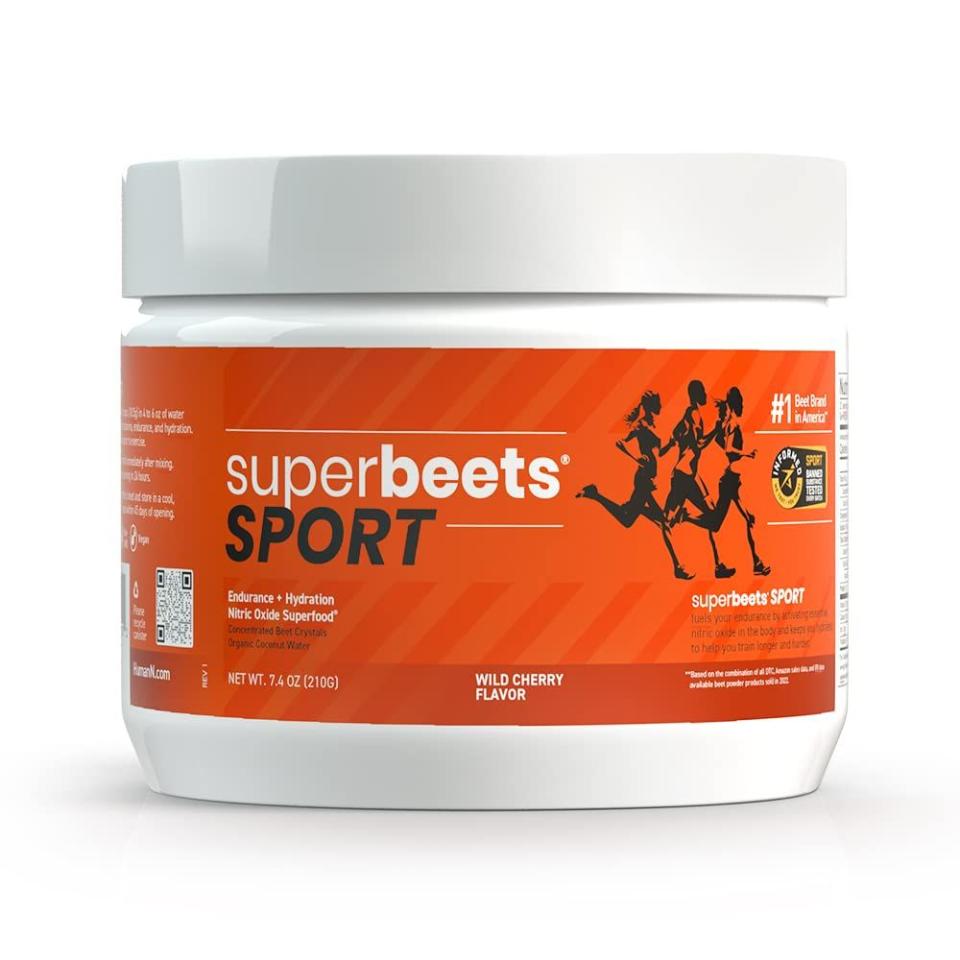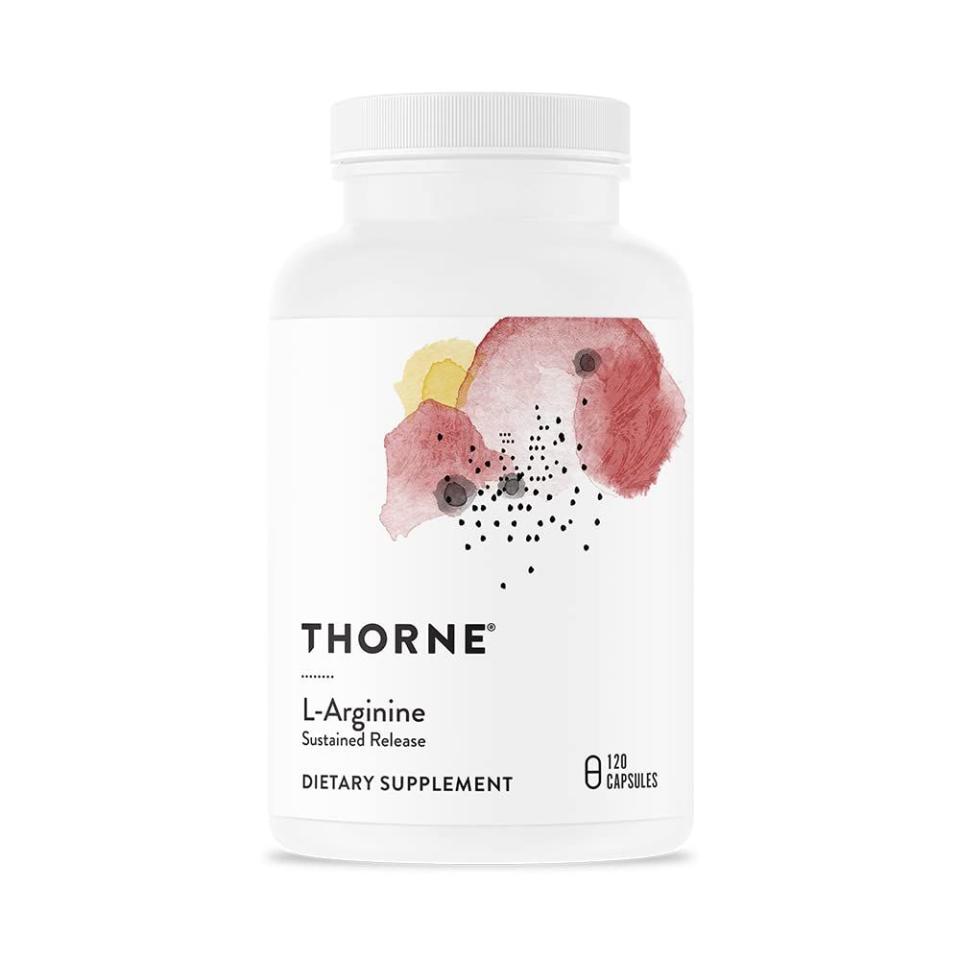Why Athletes Love Nitric Oxide Supplements For A Workout Performance Boost
"Hearst Magazines and Yahoo may earn commission or revenue on some items through these links."
There are some supplements, like magnesium or fiber, that you're probably familiar with—and maybe even read about right here at WH. Then there are others, like nitric oxide, that may ring a bell, but you're less familiar with. If that's the case, let's get ya up to speed on this buzzy workout supp.
Keep in mind, though, that supplements don’t actually contain nitric oxide. Instead, they’re made with compounds that purportedly help increase the production of nitric oxide in your body, like L-arginine, L-citrulline, or nitrates from natural ingredients like beets, says Scott Keatley, RD, co-owner of Keatley Medical Nutrition Therapy.
Nitric oxide comes up a lot in the context of performance, like helping you to run fast when you’re playing sports or enhancing your ability to work out hard.
Meet the experts: Keri Gans, RD, is the author of The Small Change Diet. Scott Keatley, RD, is co-owner of Keatley Medical Nutrition Therapy. Albert Matheny, RD, CSCS, is co-founder of SoHo Strength Lab.
So, does nitric oxide, and the supps that claim to enhance it, live up to all the hype? And—what is nitric oxide anyway? Here’s what you need to know about nitric oxide, supplements that claim to increase it, and potential risks to keep in mind.
What is nitric oxide?
At a basic level, “nitric oxide is a naturally-occurring gas formed by the combination of nitrogen and oxygen,” says Keri Gans, RD, author of The Small Change Diet. But it’s not just any random gas—it’s actually naturally produced in your body, explains Keatley.
“One of its most essential functions is vasodilation—the relaxing of the inner muscles of the blood vessels, causing them to widen,” Keatley says. “This action enhances blood flow and lowers blood pressure.”
Dark green leafy vegetables and a few other select veggies are good sources of nitrates, which your body converts into nitric oxide, says Albert Matheny, RD, CSCS, co-founder of SoHo Strength Lab. These are some of the biggies:
Kale
Swiss chard
Arugula
Spinach
Bok choy
Beet
Lettuce
Cabbage
Mustard greens
Raw cauliflower
Parsley
Carrot
Broccoli

SuperBeets Sport Pre Workout Powder
amazon.com
$38.95
humanNHow To Know If You Need A Nitric Oxide Supplement
There’s no major or obvious sign that says you need additional nitric oxide. Instead, people usually take a supplement if they are looking for ways to get more out of their workout, Matheny says.
Gans agrees: “There is no way to know for sure if you would benefit from taking a nitric oxide supplement,” she says. “If you are thinking of taking one, you should consult with your primary physician, especially if [you're] on any medications.”
And it's not really a "more is more" kinda thing: “At the end of the day, your body will not create more nitric oxide if there is excess nitric oxide available, no matter how much [of the] precursors you have in your system,” Keatley says.
Benefits Of Nitric Oxide
It may help you perform better athletically.
Nitric oxide increases oxygen delivery to your muscles, which can help reduce the effects of fatigue, Matheny says. Meaning, you might be able to exercise a little longer than usual. This doesn’t mean you’ll suddenly become Allyson Felix or anything, though—it just may help make what you’ve got work a little better.
Keep this in mind when thinking about athletic performance and all the other perks we mention: “These benefits are seen far and few between in the research,” Keatley says. For example, subjects who were given L-arginine were able to do a knee extension movement for longer than when they didn't take the supplement, according to one small study of 12 people—and many studies on nitric oxide are of this size.

L-Arginine
amazon.com
$40.00
ThorneIt may make you less sore after workouts.
It goes back to the whole oxygen delivery to muscles thing, Matheny says. When your muscles have more oxygen, they can more easily repair themselves and lead to less soreness after a workout. But again, more research is needed to conclusively say that a supplement that enhances nitric oxide has this effect.
It could lower your blood pressure.
Nitric oxide helps dilate your blood vessels, which can improve your blood flow and ultimately lower your blood pressure, Matheny says. There is some data to suggest a supplement may be helpful for this. For example, a six-gram dose (or higher) of L-citrulline can decrease systolic blood pressure and diastolic blood pressure, per a 2019 systematic review and meta-analysis. But taking a supplement in hopes of altering your blood pressure is definitely a "talk to your doctor first" type situation.
It may help with management of type 2 diabetes.
Same here: If you have type 2 diabetes, it’s important to talk to your doctor before putting yourself on any type of supplement or medication. But L-arginine could help improve insulin sensitivity, research has suggested, which could then help patients with type 2 diabetes manage their blood sugar.
It could help with erectile dysfunction.
Sure, this probably isn’t helpful for you, but it doesn’t hurt to mention that some people claim nitric oxide supplements help with erectile dysfunction (ED). Indeed, L-arginine supplements could be effective for mild to moderate ED, per one 2019 systematic review and meta-analysis of ten trials.
How To Take A Nitric Oxide Supplement
“Nitric oxide supplements usually come as precursors, often L-arginine or L-citrulline,” Keatley reiterates. The recommended dosing varies based on the specific supplement and your needs, he says, which is why talking to your doctor is important.
As for timing, it depends on what you plan to use it for, Keatley says. “Athletes might take it 30 to 45 minutes before exercise,” he says. Given that so many factors go into how you feel and how hard you can go during any given workout, it can be tricky to know if you're getting benefit from the supplement or not, Keatley notes.
Risks And Side Effects Of Nitric Oxide Supplements
If you follow the recommended dose on your supplement’s label, and it's from a reputable brand, Gans says there are no major concerns. But Keatley says there are a few potential side effects to have on your radar, just in case:
Stomach discomfort
Diarrhea
Bloating
Low blood pressure
“Since nitric oxide may decrease blood pressure, anyone with a history of low blood pressure should avoid it,” Gans says. “As always, the important thing to remember is if an individual is on any medications, [they] should consult first with their primary doctor before adding supplements to the diet.”
Bottom line: Nitric oxide plays many roles in the body, but it’s important to talk to your doctor before taking any supplements to potentially enhance it.
You Might Also Like

